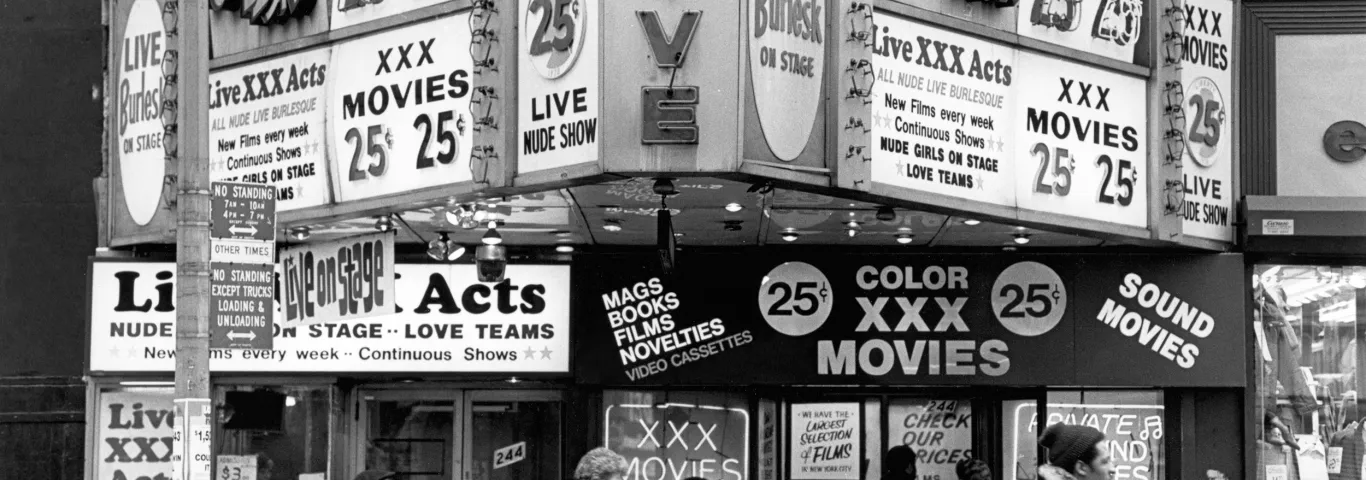
In the 60s and 70s, adult movie theaters provided increasingly public spaces for people to see pornographic materials, resulting in a series of court cases that had significant ramifications for the legal separation of the public and private spheres. Although it is still in its early stages, Erin Barry’s research has already brought up some interesting questions regarding the limits of freedom of speech, the division between public and private spaces, and the government’s relationship to its citizens’ sexuality.
Barry became interested in studying adult films in a class called “Politics of Pleasure” that she took with Amber Musser, who was at the time a professor at WashU in WGSS. “It was really interesting because it kind of brought me into this whole world of theory and really taking pornography as a subject not in black and white pro-porn or anti-porn feminism, but really looking at it as a subject in and of itself,” she says of the class. “That was something really useful for my research… and opened my mind to how I approached some of these questions of sexuality.”
One of Barry’s early papers on the history of porn discussed the court case, The People vs. Owen Bathhouse Closure, in which the San Francisco Department of Public Health sought to close fourteen bathhouses, sex clubs, bookstores, and adult movie theaters to curb the transmission of AIDS in the city. She presented this paper at the first Queer History Conference in San Francisco this year to an audience of activists and academics, many of whom were around for the closures and still remembered their impact on the community. Working on this paper about an important moment in LGBTQ+ history piqued Barry’s interest in adult movie theaters, but as she sought to learn more about them, she found the resources on the topic were scarce. “I sent an email to my advisor asking if there were any books she knew about adult movie theaters or porn theaters, and she said ‘no I don’t think so, might be a good dissertation topic,’” Barry recalls, “and I kind of ran with that.”

Photo by Bill Koska. From the San Francisco Public Library Archive.
In her current dissertation project, Barry is interested in looking at adult movie theaters as part of a broader conversation about how we define and regulate obscenity. Even the idea of what counts as porn turns out not to be as clear-cut as one might imagine. “It is very much based on perception and the whole label of obscene and pornographic is used as a tool by both sides,” she argues, noting that some films like Deep Throat were able to make it to mainstream movie theaters, while some movies that did not have simulated sexual acts in them at all but took a minority view of sex or sexuality were shown solely in adult movie theaters. She imagines that her project will begin with a prehistory of adult theaters in burlesque and stag shows, private reels, and the commercialization of vice, but that a bulk of the work will focus on the late 1960s to the early 1980s when these theaters were most popular.
Barry is in the early stages of her research, but she has already done quite a bit of archival work in San Francisco and New York, where some of the more extensive LGBTQ+ collections are located, to begin to construct a general history of adult theaters in the country. One of the largest challenges of her project has been the relative shortage of documentation on these theaters, which have become a largely forgotten element of America’s cultural history now that regulations, the AIDS crisis, and rise of home video have made them virtually extinct. Barry explains, “As with a lot of things for sexuality history, the archival footprint is not great because people don’t really like to talk about it or save things because they are seen as not being of historical value.”
By looking at court case documents and the newspaper articles that reported on them at the time, Barry is hoping to get a sense of public sentiment regarding adult movie theaters and to discover whether there were any regional differences in how communities reacted to them. She is excited about what we might learn from this history, noting, “There are some important questions at stake about the state’s relationship to the sexuality of its citizens and how they practice that in regards to public and private space but also in terms of citizenship questions and how the state perceives and regulates certain people.”
Barry says that this work is also important because it highlights a piece of our history that seems to have been largely forgotten, even though it happened relatively recently. “It is this really important piece of cultural history that played a significant role in the 70s in particular that people really didn’t know existed,” she says, “and I think it colors a lot of our understanding of the history of American sexuality in the decades after the sexual revolution.”

From the San Francisco Public Library Archive
As she enters the dissertation-writing portion of her degree program, Barry is looking forward to doing further archival work. “I really like archival work when you get a chance to just go in and sit for an extended period with all these materials,” she says. “It is like a mini treasure hunt digging for something that is useful and relevant, but it is certainly a privilege and a process to get to that point.”
In speaking of some of the “treasure” she has found already, she likes to tell a story of a document she came across in a San Francisco archive about two undercover police officers who were investigating a back-room in which customers were able to watch adult movies at individual booths. In order to see what was going on in this space, one of the officers ended up standing on the shoulders of the other one to peer into the neighboring booth. The incident happened in Los Angeles and does not play into her larger work, but it is an example of some of the more humorous attempts she has found to censor sexuality. “There are some genuinely funny and silly things that happen in local policing,” she says. “It always makes me laugh, just the image of that.” Even in this funny anecdote, however, Barry sees some of the anxieties over the divide between public and private that she hopes to draw out in her history of adult movie theaters.
Erin Barry has a wide interest in historical representations of sexuality. You can read about her work on Tijuana Bibles, short pornographic comics that were circulated in the 1930s-60s, in her article “Eight-page eroticism: sexual violence and the construction of normative masculinity in Tijuana Bibles,” which was published in the Journal of Graphic Novels and Comics in 2017.




